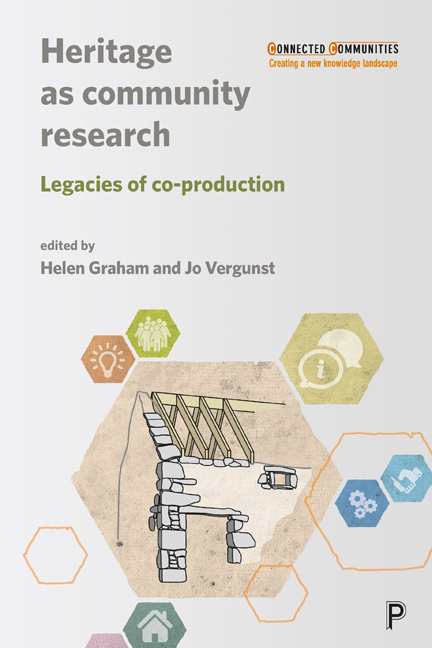four - Digital building heritage
Published online by Cambridge University Press: 27 April 2022
Summary
Introduction
In this chapter, we consider the complexities of working on jointly funded digital cultural heritage projects and explore the challenges and benefits of partnership collaborations. Co‑creation and the merging of academic research with community heritage is a powerful way of delivering heritage projects, and it is argued that ‘community engagement remains the only viable way of ensuring long term conservation of heritage sites’ (Borona and Ndiema, 2014: 184).
In presenting our experiences of the Digital Building Heritage (DBH) project, we explore a range of issues, such as the importance of relationship building and establishing trust between stakeholder groups (Thorkildsen and Ekman, 2013), and the ways in which academic partners can support community heritage, facilitating the empowerment of the community partners (Fox and Le Dantec, 2014). We encounter the dangers of conforming to a top-down model of project leadership and management and the importance of managing the politics within the group, as well as establishing the role of the project manager in collaborative co‑design and co‑production (Perkin, 2010). Like Catherine Dillon et al (2014), we discuss the difficulties of meeting the varied agenda and goals of researchers and community heritage practitioners, and consider how the outcomes of projects might be measured. We also find that while initial and tangible project outputs are realised, and positive experiences of collaboration are reported, there is sometimes limited satisfaction with the overall impact of the projects.
Working through digital means gives a distinctive perspective to these themes of collaboration and research. In common with other contributors to this book, we find heritage to be emergent in the interaction between past and present, and where digital objects are concerned, this seems even more apparent. Yet, the digital is a category increasingly inseparable from other areas of life, including other parts of the heritage sector. As Fiona Cameron and Sarah Kenderdine (2010: 3) note: ‘Digital technologies are implicated with historical transformations in language, society and culture, and with shifting definitions of the museum’. Digital objects – and processes – are themselves cultural and have their own ‘social lives’ (Appadurai, 1988), in which they circulate and are valued in different ways. Our analysis here is therefore not simply about the extent to which the 3D reconstructions are perceived as historically accurate or authentic (Galeazzi, 2018), but about the relationships that cohere around them and the links between past, present and future that they enable.
- Type
- Chapter
- Information
- Heritage as Community ResearchLegacies of Co-production, pp. 85 - 106Publisher: Bristol University PressPrint publication year: 2019



